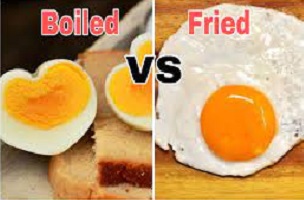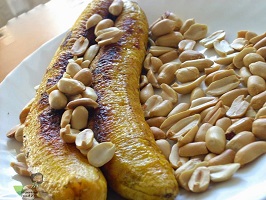Fried Eggs vs. Boiled Eggs: Which Is Healthier
Fried Eggs vs. Boiled Eggs: Which Is Better

Boiled Eggs are better
Boiled eggs are prepared without the use of butter or oil, which raises the final product’s calorie and fat content; they are healthier than other types of eggs.
While a large fried egg has 90 calories and 6.83 grams of fat, of which 2 grams are saturated, it only has 2.
Table of Contents
What are Eggs?
Eggs are a great source of protein, and whether you’re eating quail’s eggs, chicken eggs, or duck eggs, they can all be prepared similarly.
One of the most popular foods consumed worldwide is eggs. They are a common food that is consumed as a snack, cooked into desserts, or made as breakfast foods.
Eggs are a frequently consumed food category that can be prepared in a variety of ways. The two most common ways to prepare and consume eggs are boiling and frying ~ fried hard boiled eggs
However, they require very different cooking techniques. The temperature and duration of the heat used during the cooking process can have an impact on the nutrients of your egg.
Different ways to Cook Eggs
- Scrambled eggs: come in a variety of flavors, including cheese-scrambled eggs, veggies stir-fried in scrambled eggs, and pepper-scrambled eggs on toast with a dollop of cream on top.
- Poached Eggs: Eggs are poached by placing them in simmering water and removing them when the yolk is still runny but the white is fully set (about 3 minutes).
- Pan fried eggs are another well-liked breakfast option, particularly when paired with a full English breakfast. Depending on whether you prefer your yolk to be runny or hard, fried eggs are cooked to a variety of temperatures.
The three most typical trends of Fried Eggs are;
- Sunny-Side Up: For sunny-side up fried eggs, the white should be completely set but the yolk should still be runny. This kind of cooked egg is not turned over. The outcome is a sunny-side-up egg, which has a yolk that is yellow and completely encircled by white.
- Over Easy: Over easy fried eggs are prepared similarly to sunny side up eggs, but they are turned over to further cook the yolk. It still has a runny yolk.
- Over Medium: Flip and cook for an additional minute on the other side. The yolk will have a medium consistency as a result.
- Over Hard: Once the yolk is hard, flip the egg once more after the white has set and cooked for at least 90 seconds.
- Soft-boiled eggs: To prepare them, place them in a pot of simmering water for three minutes.
- Hard-Boiled Eggs: Hard-boiled eggs are extensively used in a variety of recipes, including egg salad sandwiches, devilled eggs, and egg mayonnaise. Simply place the egg(s) in a pot of water and bring it to a boil over high heat to hard boil it. The longer it stays; the harder it boils.
- Omelets: Omelettes are a traditional dish that is easy to prepare and to which virtually any item may be added.
- Baked eggs: have the benefit of being quick and simple to prepare. You can drizzle your baked egg with your preferred flavor or cover it with hot sauce.
Nutritional Value of Boiled Eggs ~ boiled eggs vs fried eggs nutrition
Eggs can be boiled in two different ways: hard-boiled eggs and soft-boiled eggs. Both kinds of foods are nutrient-dense. The main difference between fried hard boiled eggs in terms of nutrition is the length of time they are cooked for.
Each large boiled egg includes a variety of nutrients, such as:
- 13% of your daily recommended (DV) for protein
- 6% of the DV for vitamin A
- 15% of your daily value for vitamin B2 (riboflavin)
- Vitamin B5 at 7 percent of DV (pantothenic acid)
- 5% of the DV for vitamin B9 (folate)
- 9% of your daily value for phosphorus
- Your daily value for selenium is 22%
- 212mg Cholesterol
Nutrition Value of Fried Egg ~fried eggs vs boiled eggs calories
The only significant nutritional difference in fried eggs is that they contain nearly twice as much iron or 5% of the DV.
What you use to cook your eggs has a significant impact on how nutritious they are. Although butter is typically used to prepare fried eggs, if you plan to eat them frequently, you might want to pick a healthier fat, like olive oil.
Fried Egg vs Boiled Egg ~~fried eggs and boiled eggs which is better
From a nutritional standpoint, there aren’t many differences between a boiled egg and a fried egg. However, these eggs’ vitamin and mineral content might also be affected by how they are cooked.
- When eggs are boiled, which frequently results in complete cooking, the amount of healthy components such as xanthophylls is significantly reduced. This means that cooking your eggs in the water is worse than either frying them or microwaving them.
- Hard-boiled eggs that are overcooked can still be eaten, although the flavor is a little off.
- Naturally, there are various levels at which you can boil your eggs. It may be argued that soft-boiled eggs, which don’t fully cook the yolk, are slightly healthier for you than hard-boiled ones.
- Out of the most common methods for cooking eggs, soft-boiled eggs, which contain little fat and a barely cooked yolk, may have the greatest health advantages.
- Use pasteurized eggs while consuming soft-boiled eggs to lower the risk of food illness.
Scrambled Eggs vs. Boiled Eggs
Hard-boiled eggs have a higher protein content than scrambled eggs, according to the USDA Nutrition Database. In comparison to scrambled eggs
It also offers fewer calories and more beneficial elements including selenium and the B-complex vitamins. But scrambled eggs have more beneficial fats.
A boiled egg is better than scrambled eggs for weight loss
Health Benefits of Egg ~~Fried hard boiled eggs
Eggs can provide several health benefits:
- Strong muscles: Egg protein aids in the maintenance and repair of the body’s tissues, including muscles.
- The vitamins and minerals that the brain and nervous system require to function correctly are abundant in eggs.
- All the nutrients your body needs to produce energy are found in abundance in eggs.
- Eggs include selenium, vitamins A and B-12, and other nutrients that are crucial for a healthy immune system.
- Heart disease risk is decreased: The amino acid homocysteine, which may increase the risk of heart disease must be broken down. Choline; an amino acid present in eggs, is essential for this process.
- Folic acid, which is present in eggs, may help avoid birth abnormalities like spina bifida and support a healthy pregnancy
- Your eyes benefit from the lutein and zeaxanthin found in eggs, which combat macular degeneration, the leading cause of age-related blindness.
- Protein-rich foods like eggs may help people feel satisfied for longer periods, which can help with weight loss and maintenance.
- Eggs are a good source of vitamins and minerals that promote healthy skin and halt the degeneration of body components.
SIDE EFFECTS OF EGGS
When consumed in moderation, eggs may be beneficial for your health and may even help lower cholesterol if you eat the correct number of them.
However, you would need to consume a sizable quantity of eggs at once for them to have such a negative impact.
- High cholesterol levels may occur: 186 milligrams of cholesterol are found in one large egg, which is more than half of the conventionally advised daily consumption of about 300 mg.
- Your heart might be at risk: Bad cholesterol frequently raises the risk of heart disease, and eggs are no exception. Typically, after a stroke or myocardial infarction, doctors advise against eating egg yolks.
- You might become bloated: Like many things, it’s possible to consume too many eggs and wind up needing a long sofa nap while your stomach grumbles.
- You might have higher insulin resistance: The lipids in eggs can have a very serious impact on your blood sugar, especially if you overindulge.
They may worsen insulin resistance, which prevents the blood sugar from being utilized for energy as it should be.
FAQS
Which is best? Boiled or Fried
While fried eggs taste better, boiling eggs is the most practical option. Boiling eggs are considerably preferable to fried eggs in terms of nutrients.
Which is healthier? Boiled or Fried
While fried eggs taste better, boiling eggs is the most practical option. Boiling eggs are considerably preferable to fried eggs in terms of nutrients.
How Many Calories are in a boiled egg vs. a fried egg?
Compared to fried eggs, boiled eggs are lower in calories. Compared to a boiled egg, which has 78 calories, a fried egg has 90 calories. The oil in a fried egg increases its caloric content.
How Many Cholesterol is in boiled eggs vs. fried eggs?
More fat and cholesterol are found in fried eggs than in boiled eggs. This occurs as a result of the oil that was used to fry the egg.
Depending on the frying oil, the cholesterol in fried eggs is almost always bad.
Are fried eggs healthy for weight loss?
A fried egg is your best choice because it has more protein and less fat. Eat boiled eggs to reduce your weight.
For bodybuilding, Eat boiled or fried eggs?
Since fried eggs have more calories than hard-boiled eggs, they are better for bodybuilding.
However, a boiled egg is a smart choice because it has more protein if you’re looking to grow muscle.
During pregnancy, which is better-fried eggs or boiled eggs?
Women who are expecting should consume both boiled and fried eggs but care should be taken so as not to eat an egg that is not well cooked.
For weight gain, which is better a boiled or fried egg?
Eat fried eggs instead of boiled eggs if you want to gain weight.
For best weight loss? Scrambled eggs vs. boiled eggs?
Poached or boiled eggs are better calorie-wise if you’re attempting to lose weight.
The dish will have fewer calories than fried, scrambled, or omelet eggs because these cooking techniques don’t contribute any additional fat calories.
How long does to boil eggs ~ how long does to hard boil eggs? How long do you boil eggs?
- 7 minutes for a medium size egg.
- 8 minutes for a large-size egg.
- 9 minutes for an extra-large size egg.
Hard-boiled eggs ~ how to make hard-boiled eggs
- Firstly, put the eggs in a medium pot and cover them with cold water by 1 inch.
- Then, bring to a boil, cover the pot, and turn the heat off.
- Allow the eggs to cook, covered, for 9 to 12 minutes, depending on your desired done-ness
- Lastly, transfer the eggs to a bowl of ice water and chill for 14 minutes.
Soft-boiled eggs ~ how long do you soft-boil eggs?
- Firstly, bring a large saucepan of water to a boil over medium-high heat.
- Then, using a slotted spoon, carefully lower eggs into water one at a time
- After that, cook for 6½ minutes, regulating the heat to maintain a gentle boil.
- Lastly, transfer eggs to a bowl of ice water and chill until just slightly warm, about 2 minutes.
How to boil eggs
- Place eggs in a medium pot and cover with cold water by 1 inch.
- Bring to a boil, then cover the pot and turn the heat off.
- Let the eggs cook, covered, for 9 to 12 minutes, depending on your desired done-ness
Instant pot hard-boiled eggs ~ how long does to hard boil eggs in an Instant Pot?
Method
- Place 1 cup of water in the bottom of your Instant Pot
- Put the eggs in a single layer on top of the rack.
- Close your Instant Pot lid and turn the steam valve to the sealing position.
- Set the Instant Pot to manual/pressure cook, high pressure, and use the +/- button to set the cooking time to 5 minutes.
Conclusion
In general, boiled eggs are healthier since they have fewer calories and fat, whereas fried eggs, which include more fat, have a stronger aroma.
Eggs that have been poached and/or boiled (either hard or soft) may be the healthiest to consume. Additionally, these cooking techniques don’t contribute any extra calories.
All things considered, eating eggs is generally very nutritious, regardless of how you prepare them. Therefore, you could just want to design and consume them the way you prefer doing so and not worry too much about the little things.


